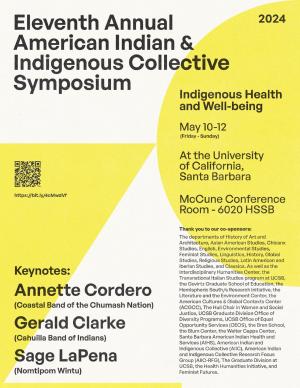Event Date:
Event Location:
- McCune Conference Room (HSSB 6020)
Event Price:
Free
Related Link:
The 11th Annual American Indian & Indigenous Collective (AIIC) Symposium, Indigenous Health and Well-being, brings together individual papers, performances, and panels from across disciplines (humanities, fine arts, social sciences, ITEK, and STEM) within and outside of the academy, including practitioners and community members. This annual gathering will address the prevalent issues facing Indian Country and beyond in terms of health disparities and how Native communities come together to heal and work toward Indigenous well-being, resilience, persistence, and futurity in the face of these disparities and structural inequities. Participants will address physical, mental, and spiritual facets of health. Interdisciplinary presentations will draw attention to how the arts are essential to the health, well-being, and healing of Indigenous people; consider scientific and social scientific approaches, including environmental and ecological health; and focus on Indigenous health teaching and activism.
Keynote Speakers:
Friday, May 10th | Sage LaPena
Sage LaPena is a Clinical Herbalist, ethnobotanist, lecturer, teacher, and gardener specializing in both Native American and Western herbal traditions. From the age of seven, Sage has been working with local medicine people from her tribe, the Northern Wintu (California), and other neighboring tribes. Sage maintains a strong connection with her tribe through continued participation in ceremonial and cultural activities. She has been teaching “Ethnobotany of California native plants” for over twenty years and leads plant walks throughout the state. Sage was a Community Health Representative (CHR ) for two years after her clinical internship with Sonoma County Indian Health. As a CHR, Sage assisted clients with diabetes care, nutritional counseling, and doctor patient translation. Sage is actively involved in watershed management projects and is currently the Water Resource Coordinator for the Hopland Band of Pomo Indians.
Saturday, May 11th | Gerald Clarke
Gerald Clarke is an enrolled citizen of the Cahuilla Band of Indians and lives in the home his grandfather built on the Cahuilla Indian Reservation, where he oversees the Clarke family cattle ranch. He is currently a Professor of Ethnic Studies at the University of California Riverside, where he teaches classes in Native American art, history, and culture. Gerald has exhibited his work extensively, which can be seen in numerous exhibitions as well as major museum collections. In 2007, Gerald was awarded an Eiteljorg Museum Fellowship and served as an Artist-in-Residence at the Institute of American Indian Arts in Santa Fe, New Mexico in 2015. In 2020, the Palm Springs Art Museum hosted Gerald Clarke: Falling Rock, the first major retrospective of the artist’s work. Clarke is a frequent lecturer, speaking about Native art, culture, and social issues. He holds a B.A. in Art from the University of Central Arkansas and M.A./M.F.A. degrees in Painting/Sculpture from Stephen F. Austin State University, located in Nacogdoches, Texas.
Sunday, May 12th | Annette Cordero
Annette Cordero was born and raised in Santa Barbara, where she attended local schools, including SBCC and UCSB. She is an enrolled member of the Coastal Band of the Chumash Nation. Prior to retiring in 2020, Annette was a faculty member at SBCC for almost 30 years. She also taught at Allan Hancock College, where she served as the first Native American/Latina president of the Academic Senate. Over the past 42 years, Annette has been a community activist and member of numerous organizations, commissions and boards, including Just Communities Central Coast, Latinos for Better Government, the original Santa Barbara Tenants’ Union, Democratic Women of Santa Barbara County, PUEBLO, the SB County Affirmative Action Commission, the SB County Human Relations Commission, and various others, consistently working on behalf of equity, access, and inclusion for disenfranchised populations.
Register here.
Cosponsored by the IHC’s Graduate Collaborative Award and American Indian and Indigenous Collective Research Focus Group, History of Art and Architecture, Asian American Studies, Chicana and Chicano Studies, English, Environmental Studies, Feminist Studies, Linguistics, History, Global Studies, Religious Studies, Latin American and Iberian Studies, Classics, Transnational Italian Studies Program, Gevirtz Graduate School of Education, Hemispheric South/s Research Initiative, Literature and the Environment Center, American Cultures and Global Contexts Center (ACGCC), Hull Chair in Women and Social Justice, Graduate Division Office of Diversity Programs, Office of Equal Opportunity Services (OEOS), Bren School, Blum Center, Walter Capps Center, Santa Barbara American Indian Health and Services (AIHS), American Indian and Indigenous Collective (AIIC), Graduate Division, Health Humanities Initiative, and Feminist Futures.

